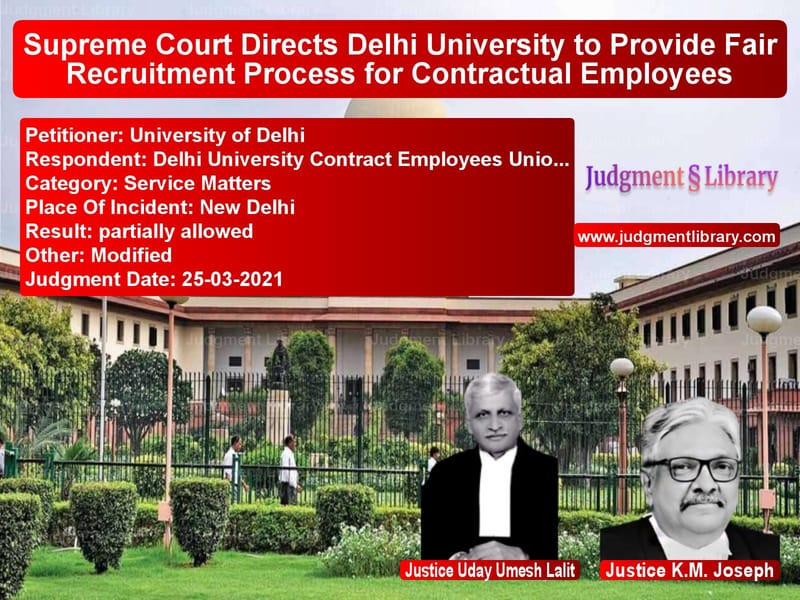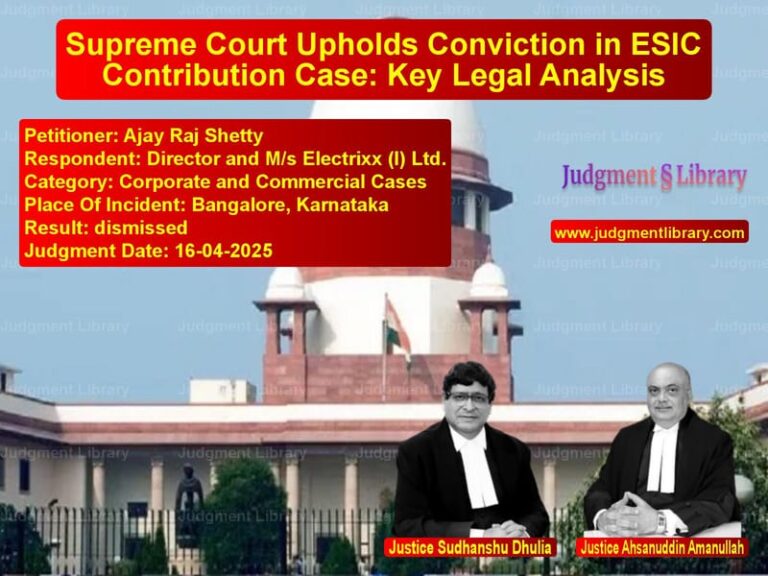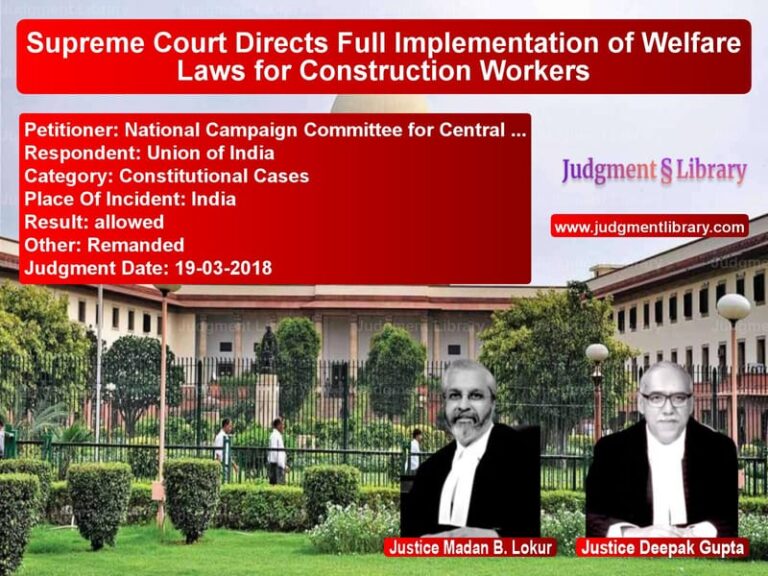Supreme Court Directs Delhi University to Provide Fair Recruitment Process for Contractual Employees
The Supreme Court of India delivered a significant judgment in the case of University of Delhi v. Delhi University Contract Employees Union & Ors., deciding on the regularization and fair recruitment process of contract employees working in the university. The case revolved around the employment rights of contract-based Junior Assistants, who had been working for several years and sought regularization of their services.
Background of the Case
The University of Delhi, following a directive from the University Grants Commission (UGC) in 1999, had imposed a ban on filling up non-teaching posts on a regular basis. Instead, the university appointed individuals on a contract basis for various administrative roles. However, by 2011, the UGC lifted the ban and approved the recruitment of 255 Junior Assistants on a permanent basis.
Despite this approval, the recruitment process remained delayed. During the period from 2003 to 2013, the university continued to employ contractual Junior Assistants. In 2013, Delhi University finally issued a recruitment advertisement to fill the vacancies permanently. The contractual employees, many of whom had been serving for over a decade, participated in the selection process.
However, only a handful of contractual employees secured permanent positions, leading to dissatisfaction among the remaining employees. The Delhi University Contract Employees Union filed a writ petition, demanding a fair recruitment process that took their long tenure and experience into account.
Petitioners’ Arguments
The petitioners, led by the Delhi University Contract Employees Union, presented the following key arguments:
- The university had employed them for years on a contractual basis despite having vacant sanctioned posts.
- The recruitment test applied the same criteria to both new applicants and experienced contract employees, putting the latter at a disadvantage.
- The contract employees had acquired significant experience and skills over the years, which should have been considered during recruitment.
- Under the principles established in State of Karnataka v. Umadevi, irregular appointments that continue for ten years or more should be regularized.
Respondents’ Arguments
The University of Delhi opposed the petition, arguing:
- The contractual employees had been appointed without following due process and could not claim automatic regularization.
- The university had conducted a fair selection process based on merit and qualifications.
- The university had already granted age relaxation and other benefits to the contractual employees to help them compete in the recruitment process.
- Regularizing contract employees without competitive selection would violate Article 14 and Article 16 of the Constitution, which mandate equal opportunities in public employment.
Supreme Court’s Observations
The Supreme Court, led by Justices Uday Umesh Lalit and K.M. Joseph, examined the case in detail and made several important observations.
1. No Automatic Regularization
“The contract employees in the present case cannot claim regularization in terms of paragraph 53 of Umadevi. The rejection of their petition by the Single Judge of the High Court was quite correct.”
The Court ruled that contract employees could not be automatically regularized merely because they had served for several years.
2. A Fair Chance for Contract Employees
“Though regularization cannot be granted, a window of opportunity must be given to contract employees to compete in the selection process with some additional benefits.”
The Court emphasized that experienced contract employees should be given a fair opportunity in the recruitment process.
3. Providing Competitive Advantage
“The benefit of age relaxation must be extended to all contract employees. Additionally, those who have served longer must be given an advantage in the selection process.”
The Court directed that additional marks should be awarded based on the number of years of service as a contract employee.
Supreme Court’s Verdict
The Supreme Court ruled in favor of modifying the recruitment process to ensure fair competition for contract employees. The key directives were:
- Age relaxation should be granted to all contract employees.
- Additional marks should be awarded based on years of service:
- Employees who served since 2011: 10 extra marks
- Employees who served since 2010: 11 extra marks
- Employees who served since 2003: 18 extra marks
- The selection process should be held within four weeks, allowing contract employees to apply.
- The recruitment test should take place only after three months, giving employees sufficient time to prepare.
Impact of the Judgment
The ruling has several significant implications:
- It ensures that long-serving contract employees receive due consideration without violating principles of fair competition.
- It sets a precedent for similar cases where contract employees demand regularization.
- It reinforces that regular employment should be based on a transparent selection process.
Conclusion
The Supreme Court’s judgment in the Delhi University contract employees’ case strikes a balance between the rights of contract employees and the principles of fair recruitment. By granting experienced workers additional benefits in the selection process while maintaining open competition, the Court has set a benchmark for employment policies in public institutions.
Petitioner Name: University of Delhi.Respondent Name: Delhi University Contract Employees Union & Ors..Judgment By: Justice Uday Umesh Lalit, Justice K.M. Joseph.Place Of Incident: New Delhi.Judgment Date: 25-03-2021.
Don’t miss out on the full details! Download the complete judgment in PDF format below and gain valuable insights instantly!
Download Judgment: university-of-delhi-vs-delhi-university-con-supreme-court-of-india-judgment-dated-25-03-2021.pdf
Directly Download Judgment: Directly download this Judgment
See all petitions in Employment Disputes
See all petitions in Recruitment Policies
See all petitions in Public Sector Employees
See all petitions in Judgment by Uday Umesh Lalit
See all petitions in Judgment by K.M. Joseph
See all petitions in partially allowed
See all petitions in Modified
See all petitions in supreme court of India judgments March 2021
See all petitions in 2021 judgments
See all posts in Service Matters Category
See all allowed petitions in Service Matters Category
See all Dismissed petitions in Service Matters Category
See all partially allowed petitions in Service Matters Category







